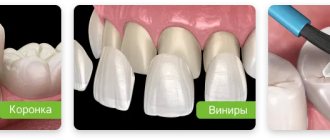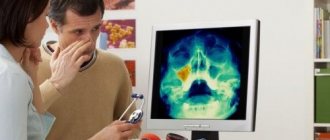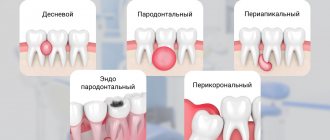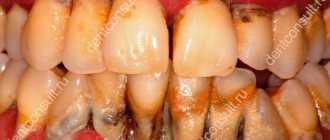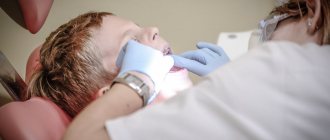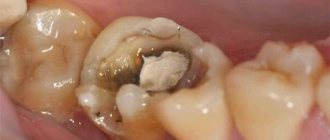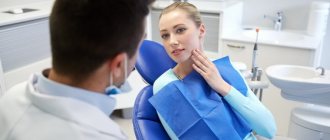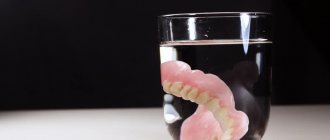Localization and nature of toothache
It's hard to go wrong with a sore mouth. A person can easily describe where and what hurts. Painful sensations can differ both in intensity (sharp and strong or weak and aching) and frequency (for example, at night - that’s another test). Toothache can affect one tooth or several in a row, on one or both jaws. The pain can radiate to the temple, affecting not only the eye and ear, but also causing migraines. Moreover, the trigger (trigger mechanism) for such sensations is not necessarily hot tea or cold ice cream. Sometimes a person describes their occurrence as “out of the blue.”
Let's try to summarize the types of toothache:
- Aching, sensations are dull and not intense.
- Shooting, sharp, in the form of sharp impulses, causing suffering.
- Sharp, unexpected, independent of the time of day.
- Long-lasting, “background”, tolerable, so the patient puts off seeing a doctor.
Each of the above types of pain indicates a particular pathology. With a timely visit to the dentist, there is every chance of maintaining a beautiful smile and healthy teeth. Otherwise, unpleasant consequences will not keep you waiting.
When is a person to blame for having bad teeth?
Experts identify a number of causes of tooth decay, for which the patient himself is to blame. Knowing them, you can take timely measures to prevent the development of the disease. These reasons include:
- Smoking. Components released from tobacco disrupt metabolic processes in dental tissues. Due to this, their ability to resist adverse effects is sharply reduced.
- Alcohol, drugs. They negatively affect the functioning of the entire body, impair its protective functions and ability to recover.
- Poor nutrition. Lack of minerals and vitamins in food leads to weakening of the enamel. An excess of sweets, sour fruits, and berries contributes to the destruction of enamel.
- Unhealthy Lifestyle. Lack of physical activity, constant presence in dusty rooms, abuse of fatty, fried foods reduces the body's protective functions.
In addition, lack of or improper oral hygiene contributes to the formation of plaque. It becomes a source of food for microorganisms that gradually destroy teeth.
Diagnosis of toothache. Features of complications in the absence of treatment
The correct diagnosis can only be established after examining the oral cavity. The dentist must analyze complaints, obtain information about concomitant ailments, previous injuries and find out the nature of the pain. Then prescribe adequate treatment
A visual examination by a doctor may include the following manipulations:
- applying light tapping movements to the tooth to determine the location of the pathology;
- determining the reaction to exposure to heat;
- examination of the condition of the enamel using a special lamp or laser;
- study of the condition of dentures, if any;
- X-ray diagnostics to identify foci of inflammation, root fractures and other hidden problems;
- 3D computed tomogram, which allows you to obtain a three-dimensional model of an organ, view the internal structure of the bones, identifying neoplasms and cysts.
CT scan.
Network of dentists “Smile”, Shchelkovo Whatever the toothache is - severe, low-intensity, nagging, sharp, appeared today or has been lasting for several days - make an appointment with a dentist. Even if the pain has subsided and does not manifest itself at all, you cannot cancel the visit. Some insidious diseases (such as pulpitis) can behave changeably: after a sudden exacerbation, some relief may occur. However, you should not wait for the next attack or hope that the disease has gone away on its own and the pathological process has stopped.
Note! Before visiting the dentist, do not take medications that relieve pain - analgesics (tablets, injections). This will blur the symptoms, and it will be difficult for the doctor to make a diagnosis, not to mention the correct treatment regimen, due to the dulling of symptoms by painkillers.
Characteristic symptoms and stages of disease development
Dental problems manifest themselves in different ways. It depends on the degree of damage, the sensitivity of the body, and the number of problem areas. Tooth decay does not occur in just one day.
Dentists distinguish several characteristic stages, which are characterized by certain symptoms:
- Unpleasant smell. At first it is not too noticeable. Gradually, even during a conversation, the interlocutor feels a putrid “aroma”. Its source is pathogenic bacteria. They inhabit plaque that forms at the point of contact between the gum and tooth.
- Stains on the enamel. This is the next stage of the disease, when the damage spreads deeper and damages the enamel.
- Black areas. If they are located on the root, it is very difficult to notice them. To clarify the extent of the damage, an x-ray is taken.
- Formation of the cavity. A cavity forms in place of the black spot. Through it, food debris gets to the inside of the tooth. The tooth actively “signals” about the problem with painful sensations, reaction to hot and cold.
- Pulpitis develops. By not consulting a doctor in time, the patient allows inflammation to reach the pulp. Soft tissues containing blood vessels and nerves undergo rotting. It is accompanied by sharp, unbearable pain.
The decay process ends in different ways. If it starts from the top of the tooth, it gradually spreads to the root. After the nerve dies, the pain intensity decreases. If decay affects the root first, the tooth may fall out or have to be removed.
Reasons why a tooth may hurt
The appearance of toothache often comes as a surprise, because it can occur even if the teeth appear to be completely healthy. In any case, if you feel pain in your teeth, you should immediately visit a dentist.
First, the specialist will find out the cause of the pain (hypersensitivity, caries or something else). There are several types of causes of tooth pain:
- bacterial (gum disease, pulpitis, caries);
- mechanical damage to the enamel;
- general diseases.
Let's look at the most common causes of toothache in more detail:
Caries. Toothache due to enamel destruction
The most common cause of toothache is diseases caused by the proliferation of bacteria that can destroy tooth enamel from the outside and inside.
A lot of people have caries, and not all of them know about it. The disease manifests itself in the form of darkened spots on the surface of the teeth. It is interesting that at first the spots are white and can stand out against the background of the darker surface of healthy enamel - this is the stage when bacteria are still destroying the tooth shell with the products of their vital activity.
As caries progresses, bacteria penetrate deeper into the center of the tooth, the focus of the disease becomes wider and can cover neighboring teeth. By breaking through the mineral layer and reaching the soft dentin, the carious process accelerates.
At the culmination stage of caries, if the disease is not treated properly, bacteria penetrate the pulp, covering the vascular and nervous tissue, as a result of which the tissue becomes inflamed and begins to ache. This is how pulpitis develops. Treatment of this disease consists of cleaning the soft insides of the tooth, disinfecting the tooth cavity and placing a filling, sometimes (in particularly advanced situations) requiring removal of the affected nerve.
Pulpitis. Dental nerve pain
Pulpitis is an inflammation of the neurovascular bundle located in the tooth. The pulp (vessels and nerves of the tooth) swells and affects the walls of the chamber, which causes pressure on the nerve endings. This is where severe pain arises, intensifying every day. A common cause of pulpitis is caries, which progresses too much due to lack of timely treatment. Microbes, toxins and other harmful substances make their way from there to the nerve and interact harmfully with its tissues.
Powerful painkillers will help you quickly get rid of acute pain. But for complete and high-quality treatment, you need to contact qualified specialists. How do dentists deal with infection that affects the nerve of a tooth?
- Anesthesia is used for the affected area;
- The pulp chamber is opened;
- The nerve is removed;
- Clean the canals located at the root;
- The canals are washed and then filled;
- Place a filling on the crown
The pain with pulpitis and with caries is different. With caries, it is not strong, it increases with the consumption of cold and hot drinks and dishes, and inhalation of cold air. The pain associated with pulpitis is acute and unbearable, appears at unexpected moments, for example, in the middle of the night, and can radiate to the temples, cheeks and nose (if a tooth in the upper jaw is affected), ear and neck (if a tooth is affected in the lower jaw). With pulpitis, the pain persists for a long time, without subside or weakening, but with caries it subsides when the irritant disappears (example: sweets fall on a tooth affected by caries - the tooth hurts, remove the sweets - the pain subsides).
Another possible cause of pain is diseases resulting from untreated or neglected caries or pulpitis - cysts, granulomas, periostitis (festering of the gums in addition to symptoms of pulpitis or caries), periodontitis (swelling of the gums, mucous membranes, sometimes parts of the face, often with any absence of pain).
Eruption of wisdom teeth and the appearance of pericoronitis
During the growth of the last tooth in a row, people experience severe pain that affects the cheeks, jaw and even throat. Toothache during tooth growth is aching and pulling, and can be accompanied by pain in the head and neck, as well as pericoronitis - inflammation of the gum tissue caused by a lack of available space on the jaw. A tooth can erupt under the gum hood correctly or incorrectly. In the first case, the gum hood is excised to facilitate its development and save the patient from suffering.
Incorrect eruption of wisdom teeth is caused by a lack of space in this area of the gum. Its further growth will be accompanied by severe pain, inflammation, complications and may even lead to death. To avoid this, doctors advise immediately removing the harmful tooth and not allowing it to develop further.
In this case, you must immediately contact a surgeon. Self-treatment will not bring results, but will only hasten the development of sepsis, phlegmon, and in the worst case, death.
Gingivitis. Gum inflammation
The gums can be affected by diseases such as periodontal disease or periodontitis. With such inflammation, bleeding and pain in the gums are observed, and chewing food becomes especially painful. Most patients perceive these sensations as toothache. Such diseases can lead to exposure of tooth roots, which explains increased sensitivity. If the infection passes quickly or is not noticed in time, then pathogenic bacteria can penetrate even into the pulp, which can lead to the loss of a tooth, or even several.
Periodontitis
Periodontitis is characterized by inflammation of the tissues around the tooth root. The dead pulp remains inside the canal and its purulent contents flow to the gum. This provokes severe acute pain that prevents you from even touching the tooth. The patient has difficulty chewing food and drinking too cold/hot drinks.
Periodontitis is an exacerbation of gingivitis, periodontitis, and pulpitis. Another cause of the disease can be poor oral hygiene, bad habits, and careless surgical procedures.
It is impossible to get rid of pain during periodontitis on your own; urgent and mandatory medical intervention is needed. Doctors will open the canal for a certain amount of time to allow the pus to drain out. Thanks to soda/soy rinses, microbes will begin to die, and therefore inflammation will stop.
ARVI, sinusitis, sinusitis
Bacterial and viral diseases such as sinusitis or sinusitis affect the mucous membranes of the sinuses, which is dangerous for the teeth due to their close proximity to the jaw.
Such inflammation can lead to pain in the upper row of teeth. A similar situation can happen to the lower jaw if a person has a sore throat or pharyngitis, for example, since with such inflammation the lymph nodes suffer.
Injuries, tooth root fracture, cracks and chips
Chips of fillings, injuries to the tooth roots and cracks in the enamel can be the consequences of mechanical damage caused by bruises or chewing too hard food. In this case, the patient may experience pain not only from the injury, but also due to inflammation, which appears as a result of infection entering the pulp through cracks. The pain in this case can be sharp, dull, strong or weak, so an x-ray or orthopantomogram (OPTG) is necessary to identify the exact cause of the disease.
Whitening procedures and pastes with abrasive particles
Teeth whitening can lead to increased sensitivity (hyperesthesia). This happens during the procedure because the removal of the bacterial layer is followed by a violation of the mineral composition of the enamel. If this happens, then usually all teeth suffer, but the front teeth receive the greatest damage, since they are in the visible zone, and they are whitened especially carefully.
A hard toothbrush and strong pressure while brushing
Everyone knows that brushing your teeth should be done twice a day for 2 minutes , but few people know that it is also important to choose a toothbrush with the right level of hardness and not put too much pressure on your teeth during procedures. Fulfilling these conditions is very important for maintaining healthy teeth and oral cavity. If you ignore these factors, you can easily damage the enamel, which will result in aching pain in your teeth or increased sensitivity to high and low temperatures.
Hypothermia and inflammation of the facial nerves
Inflammation of the trigeminal nerve is a well-known and unpleasant ailment. Undoubtedly, spending time outside is very beneficial for the health and immunity of people of all ages. But long walks when the temperature on the thermometer has exceeded -20 and the absence of a hat in windy weather can lead to such a painful and aching pathology as inflammation of the dental nerves.
General diseases of the body
In the fast pace of modern life, not every person can remain completely healthy. A large information load leads to chronic fatigue, stress and neurological disorders. The listed ailments affect the functioning of the brain: it begins to transmit distorted nerve signals that can reach the teeth and cause aching pain. In this case, you should first go not to the dentist, but to a psychotherapist or neurologist.
Pain in the lower jaw or lower molars may be due to cervical chondrosis. This pathology appears in people who lead a sedentary lifestyle, mainly at the computer. The head remains in one position for a long time, which causes the spine to bend and lead to compression of blood vessels/nerves, and all this has an extremely negative effect on the sensations in the teeth.
Stomach pathologies have a negative impact on the condition of teeth. For example, with heartburn, stomach acid enters the oral cavity and destroys the enamel. Because of this, dentin is exposed, which leads to increased sensitivity of the tooth.
Lack or improper intake of vitamins, dietary disorders
It is known that acids can cause hyperesthesia, accompanied by pain in the teeth. For children, the elderly and people with sensitive enamel, it is best to avoid foods with vinegar and citric acid. You should take vitamin C only when necessary and with non-acidic foods (for example, rosehip decoction). By the way, rose hip decoction contains more vitamin C than lemon.
Berries, fruits, vegetables, herbs, cottage cheese, eggs and nuts are essential components of a healthy person’s diet. Due to their absence, the mineralization of the enamel worsens, which means the oral mucosa suffers. Without beneficial and useful substances in the body, the enamel is destroyed: it becomes thin, susceptible to cold and hot, and reacts sharply to solid foods.
Imaginary acute toothache really exists! Many believed that it was a fantasy of overly emotional and impressionable people. However, there is a scientific explanation for this. After a tooth is removed, the nerve endings of the gums in its place begin to actively recover, which leads to phantom sensations. This condition can last for several weeks and goes away on its own.
Throbbing after dental procedures
Throbbing pain in a tooth can occur after the installation of a filling, tooth extraction, crown fixation and orthodontic treatment.
Throbbing pain occurred after tooth extraction
Painful sensations after the end of anesthesia and tooth extraction are a normal reaction of the body to a traumatic procedure. To eliminate “twitching”, painkillers are allowed in the first 1-2 days. The intensity of the pain gradually, the discomfort goes away within 3-4 days. After the removal of wisdom teeth and molars (6th, 7th and 8th teeth), the gums hurt and pulsate a little longer.
Increasing pain after removal of a dental unit may indicate the development of alveolitis. Inflammation of the dental socket develops due to the left fragment of granuloma (periodontitis) or root fragment. However, in most cases, alveolitis is caused by premature washing out of the blood clot and infection of the wound.
Important! It is prohibited to actively rinse your mouth after tooth extraction.
Tooth pulsates after filling
The dentist placed a nerve-killing drug into the root canal and installed a temporary filling. Do not panic if you experience throbbing pain from time to time for 3-4 days. However, if discomfort lasts longer, it is necessary to visit your dentist unscheduled. It is possible that the medication under the filling caused irritation to the surrounding soft tissue.
There may be several reasons for tooth pulsation under a permanent filling:
- insufficiently thorough cleaning of the carious cavity,
- poor quality filling installation,
- radiating pain from a neighboring tooth.
To exclude infection of the filled tooth and re-development of caries, it is necessary to take an x-ray.
Tooth pulsates after nerve removal
A filled tooth with a removed nerve should not hurt. The exception is when the dentist cleans out a root cyst and installs a temporary filling. After cementing the cystic cavity and filling the canals, the tooth may pulsate (without pain!) for several days.
If the pulpless tooth still begins to hurt, the dentist probably made a mistake and installed the filling unsealed. A slight painful pulsation will occur after eating. It is possible that the tooth was affected by periodontitis and a fibrous compaction formed on its root. In any case, if discomfort occurs after nerve removal, you should visit a dentist.
Important! To avoid negative consequences, before treating a dental cyst and removing a nerve at the Matiss Dent clinic, the patient is given an X-ray.
The tooth under the crown is pulsating
Painful pulsation after crown installation indicates that a medical error was made during prosthetics:
- tooth root infection occurs,
- the channel is poorly dried,
- the tooth is too ground and the crown does not fit tightly.
The crown will need to be removed, the tooth canal will need to be treated with an antiseptic again and a new prosthesis will be made.
Teeth pulsating under braces
Installation and tightening of braces, especially metal ones, often provokes pulsation in the gums. If the pain does not go away after a few hours, then the arch is too tight. Contact your treating orthodontist. The doctor will adjust the pressure of the braces on the teeth.
Why does a tooth ache under a filling?
The filling, placed several years ago (6-7), could be pressed through and deteriorate under the influence of external factors. The tooth will hurt if the pulp is alive and the position of the filling is disturbed. Pain also occurs in the following cases:
- Pain after a short period of time after seeing a doctor is most likely a medical error, for example, the canal was not cleaned well enough, there is still an infection inside, an instrument broke during the procedure;
- Pain after a long time after seeing a doctor is a violation of the seal of the old filling.
In any case, you cannot get rid of such an illness on your own. Contact your dentist in a timely manner so as not to start an inflammatory pathological process.
A child’s teeth are rotting: to treat or not to treat?
Rotten teeth are in most cases a problem for adults. However, this process can affect baby teeth. Moreover, the path from the appearance of a small spot to a severe stage passes very quickly. The reasons for this phenomenon are the same as in adults. At the same time, we can identify characteristic factors that have a negative impact on children’s teeth:
- excessive love for sweets;
- insufficient oral hygiene;
- mother's dental problems during pregnancy.
It is impossible to stop rotting at home. You must contact your dentist immediately.
Why does a dead tooth hurt suddenly?
Many people believe that a dead tooth cannot hurt? But what does the expression “dead tooth” mean? This is a tooth with dead or removed pulp. Yes, due to periodontitis, the nerve dies, but remains inside the pulp, which is why it begins to decompose over time. From there, the pus goes to the root, causing the surrounding tissue to become inflamed. This is how acute pain occurs.
There are several reasons why a dead tooth becomes especially sensitive (due to complications) before and after treatment:
- Low-quality treatment and cleaning of dental canals;
- Medical violations when placing a filling: the edges of the filling extend too far beyond the root;
- Not all tooth canals have been cleaned, some of them are missed or not completed;
- Allergy to the material from which the filling is made
It is important to understand that tooth disease after treatment is a normal and natural process. It is called post-filling syndrome, which lasts for several weeks (1-2). If it really is him, then the pain will weaken every day. However, if the pain does not disappear and even increases daily, then this is a significant reason to repeat the appointment with the doctor.
SIGN UP ONLINE
Negative factors beyond the patient's control
If a person does not smoke, engages in debate, and watches his diet, why do his teeth begin to rot? There may be several reasons for this:
- Bad ecology. Polluted air, poor quality water, an excess of some and a lack of other important components. Fluoride deficiency is often cited as the cause of dental problems.
- Heredity. If the parents had bad teeth or the mother did not visit the dentist during pregnancy, children often experience similar problems.
- Physiological features. Hormonal imbalance in adolescents during the growth period, in pregnant and lactating mothers.
Tooth decay is often a consequence of other diseases. Problems with periodontal tissues - gingivitis, periodontitis, periodontal disease - lead to the development of caries and cause tooth loss. If a purulent cyst forms near the root, the infection quickly spreads to the tooth. Often the deterioration of teeth is caused by diseases of the stomach, intestines, and thyroid gland.
How to treat aching pain in teeth?
A treatment plan is drawn up after the diagnostic results, when the cause of the pathology is identified and pain is localized. Conventionally, several techniques can be distinguished that are used depending on the factors contributing to the occurrence of pain.
- Therapeutic treatment. It is prescribed when the main cause of aching pain is caries or periodontal disease. In case of caries, filling or endodontic treatment is carried out (if bacteria have penetrated the pulp). In case of periodontal inflammation, special ointments and antiseptics are prescribed, curettage is performed, and in severe cases, teeth are splinted.
- Prosthetics. In the presence of a wedge-shaped defect and serious damage, dental prosthetics are performed with single crowns or bridges. In case of enamel pathologies, the doctor may recommend veneers, which are installed to achieve a certain aesthetics.
- Restoration and strengthening of enamel. What to do if all your teeth ache? If the patient has weakened and thinned enamel, it is necessary to strengthen it. First of all, the doctor treats the enamel surface with special compounds based on calcium and phosphorus, and also prescribes a special diet and means that strengthen the immune system and the health of the body.
To eliminate pain, painkillers (Nurofen, Nimesil and others) can be prescribed. If the aching pain is not associated with dental problems, treatment is carried out by doctors of relevant specializations.
What can you do if all your teeth hurt at once?
It is important to understand that you cannot endure severe pain, especially in all teeth at once. If you experience discomfort, you should visit the nearest dental clinic as soon as possible and undergo an examination. Under no circumstances should you take strong painkillers for a long period of time, especially without a doctor’s prescription.
If you neglect your health, the consequences can be irreversible and very serious. Experts do not recommend applying hot compresses to the sore spot, as increased blood circulation can lead to even more unpleasant sensations.
To alleviate your condition a little before going to the clinic, you can rinse your mouth with a soda solution. It is also allowed to take 1-2 tablets of the most common painkiller, for example, analgin. Before purchasing, you should definitely consult with the seller; most likely, he will be able to suggest the most suitable drug.
previous post
What to do if a tooth is overgrown with gum?
next entry
Caries on baby teeth
As a result of long-term research, scientists were able to identify the main cause of caries in baby teeth. It becomes: microorganisms transmitted to the child from the mother. Streptococcus gets to the baby through a kiss, through a pacifier licked by the mother, or shared cutlery. Microbes come from other people through these same routes. When teething, babies are especially vulnerable to streptococcus. In addition, lack of oral hygiene, poor diet, and the composition of saliva have a negative impact.
Dentists point out that regular use of baby formulas from a bottle with a high carbohydrate content creates ideal conditions for the development of bacteria. Getting your baby used to a cup and rinsing his mouth after eating helps reduce their negative effects.
previous post
Pin in a tooth: types and advantages of design
next post
Features of the treatment of trigeminal neuralgia
Toothache with neuralgia is a signal to immediately seek help from a neurologist. Inflammation of the trigeminal nerve is a serious problem that requires qualified assistance. Treatment of neuralgia must be comprehensive to achieve the best results in the fight against the disease.
In the process of treating neuralgia, it is important to correctly determine the cause and type of inflammation in order to be able to prescribe the appropriate treatment. When secondary neuralgia develops, before treating the main problem, it is necessary to eliminate the disease that was the cause.
To eliminate trigeminal neuralgia, specialists use therapeutic and surgical treatment methods. Most often, drug treatment is used in the form of drugs with an anticonvulsant effect, antihistamines, and vitamin therapy. However, if the use of medications is ineffective, it becomes necessary to act on the nerve through surgery.
